Brenda Knight Graham's Blog, page 19
April 22, 2021
Popcorn Picnic
Children help us step outside the box of traditions and take on a new perspective. They give us a new outlook on the ordinary. They give us laughter and make our hearts light.
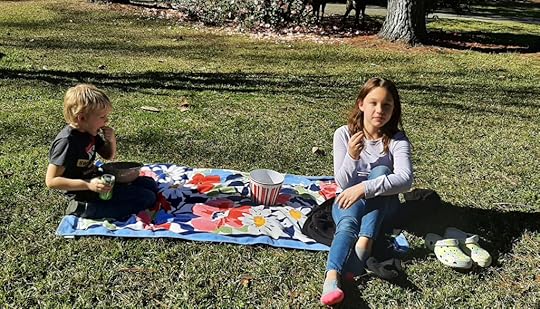
One blustery March day when hot chocolate seemed like a good snack, my two great grandchildren said, “Let’s have a picnic!” Now, I’m up for a picnic almost anytime, but that day really didn’t seem like a picnic day. But I asked what they wanted for their picnic. The answer was popcorn.
A popcorn picnic on a cool breezy day?
A picnic is a pleasant, fun, event more often associated with summer. You may think of a picnic by the sea or a picnic in the mountains, or a picnic in the park. But of course a picnic can be anywhere you spread out a blanket, or settle around a table for that matter. Just call it a picnic and it’s a picnic! You may think of PBJ sandwiches or pimiento cheese. You think of stuffed eggs and fried chicken. You think of crisp cookies and potato chips, maybe apples or bananas. But I think this was the first time we’ve had a popcorn picnic.
When I think of popcorn I think of the exciting sound of the popping, the buttery smell, the fluffy mounds of snowy kernels magically made from those hard little seeds. The warm friendly smell reminds me of the theater, a good movie with family members. It reminds me of going to a country fair, fun at a fall festival, and football games. I remember my parents popping corn in a corn popper held over an open fire. It was a rare occasion when we had popcorn and thus a very special one. The popper was a contraption with a pan that was closed and could swivel on long handles, turning upside down and right again as the corn began to pop. Daddy joked that the popping corn was the sound of soldiers firing away inside the pan.
Charli found the bright beach towel I sent her for, Kaison hauled a packet of popcorn out of the pantry. With some bickering they popped the corn, poured it in bowls, and headed out to a nice grassy place near the mulberry tree. Munching on popcorn and sipping sodas, they were happier than clams on the seashore. They tossed kernels in the air and tried to catch them in their mouths. It was nice no one would have to sweep popcorn from the den floor! I huddled, shivering, on a bench nearby, joining in their chatter and a guessing game or two, then watched them play badminton. They didn’t worry about the wind blowing the birdie in all directions, just thought it was funny.
On another day when summer had invaded spring Kaison disappeared for much too long and I went hunting for him. I finally realized that the odd pile of pillows on the couch was his fort and he was inside it. That fort, as it turned out, was a hiding place for Kaison to play his cell phone games, free from shadowy glares and free from Nana’s prompting to “go outside and play.” When he emerged from his seclusion he was drenched with sweat.
We’ve learned never to throw away a big box if there are children who can enjoy it for a day. That box becomes a fort, a theater, a playhouse, and even a monster’s mansion. Though sturdy treehouses can be very nice, don’t discount the fun two lively children can have in a cattle trailer. An old fashioned lawnmower, relic of quieter days with no motor, becomes a source of great entertainment even for kids who have dirt bikes and four-wheelers at home. And oh, the fun they can have with a box of chalk and an asphalt driveway.
Some of their ideas don’t work, such as trying to catch butterflies in January or climbing a tree in flip flops. Some attempts have to be thwarted by stuffy adults for being too risky, like chasing each other with six foot bamboo swords.
It’s a good thing, though, to listen to the children’s proposals, such as a popcorn picnic. You can learn a lot. And just maybe you’ll have a chance to share one of your own bits of wisdom or even fit their energy to accomplishing a chore, like picking up pine cones or pulling weeds.
Considering the inventiveness and freshness of children’s play, I’m reminded of the cartoon Charles shared the other day. A little boy says to his father, “When I grow up my shoes will be bigger. I’ll have longer laces so you won’t have so much trouble tying them for me, Dad.”
Robert Louis Stevenson was one of those fortunate people who never did grow up, at least not in attitude. He wrote this poem for his book “A Child’s Garden of Verses”:
“When I am grown to man’s estate
I shall be very proud and great,
And tell the other girls and boys
Not to meddle with my toys.”
April 14, 2021
The Lonely Heron
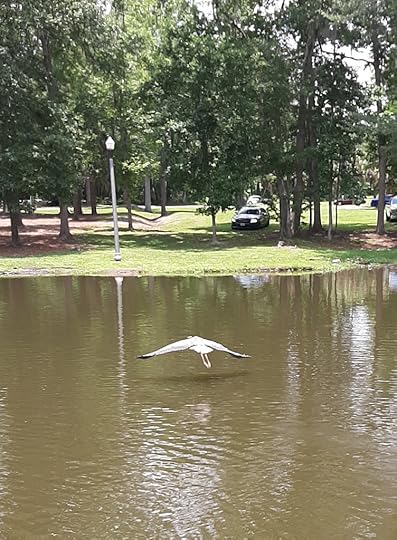
The lonely heron (or egret) stood at the edge of the water, long spindly legs supporting his perfectly white feathered body, his ess curved neck turning occasionally with calm deliberation. His long sharp beak must have ignited fear in every little mud scrambler or water creature, although they didn’t have to fear for long. He was so quick at snatching a morsel of dinner you would hardly notice.
There were a few ducks nearby, such different fowl from the heron. They swam and feasted, sometimes simultaneously, moving effortlessly from one area to another. The ducks were playful, pestering each other, diving head first into the cloudy water and coming up a distance away. The tall heron was silent and stood for long minutes as still as one of the sweetgum trees or oaks nearby, only his alert eyes seeming to move at all.
On the other side of a wide boardwalk, gliding towards the deep water, were black and gray Canada geese. Perhaps less playful than the ducks, they still were noisy and opinionated, asserting their claim to the lake. They were sociable, communicating with each other. Three more geese flew in from the other side of the lake, slicing smoothly into the water’s surface and instantly becoming part of the party.
Still, the heron kept watch, only moving a few feet occasionally along the edge of the water, sometimes in the water, yellow legs making squiggly reflections, sometimes on the shore. He seemed preoccupied as if he were studying to make a long speech. Then, like a snake striking, he would bend his long neck and spear a fish or frog pulling them neatly out of the lake, barely disturbing the surface.
There were several kinds of ducks, some dark brown, some almost golden, some male Mallards with unbelievably colorful markings–glistening green heads, a brown bib, as well as black and gray feathers along their backs. The mama Mallards are just as pretty in a much more subtle way. There weren’t many white ducks but two or three pair. They swam and foraged for water weeds and rested together not mixing with other ducks, or with the geese, or trying to converse with the silent heron.
Why was that heron all alone? Every time we went to Lake Cherokee (about once a week during the long Covid year) we could depend on seeing him there in the same location, all alone, no other heron to keep him company. I use the male pronoun, though I have no idea what sex the heron is. Maybe it was a she all alone with no one to tell her whether or not her feathers were smooth or to tell her troubles to. Whichever sex, why were there no other herons? When we had Covid we were absent from the lake for several weeks. When we went back, there was that heron, the only one of his kind, still fishing the same corner of the lake.
With my penchant for romance, I rushed to assume that herons mate for life, that the mate of this one had died, and that this lonely widow or widower stalked the shores or took flight across the tiny inlet, day by day, year by year, sad and grief stricken.
Then I decided to learn more about this lovely, sad, amazing bird.
I haven’t by any means done an exhaustive study but here are a few facts I have gleaned.
The great heron, great egret, snowy egret, and blue heron all have a wingspan of 4.3 to 5.6 feet and stand three to four feet tall. It is very hard for an amateur to distinguish between some of these herons and egrets so I’m not sure my lonely bird is a great heron or a great egret but I know it is great! Some have long thick yellow beaks and yellow legs, some have dark beaks and legs. Some grow beautiful plumes during mating season. The majestic great blue heron is colorful, but most of the egrets and herons are white, some snowier than others.
During mating season herons pair off though there’s no proof they mate for life. The male builds the nest in the top of a very sturdy tree, usually near water. Sometimes he lets his mate help him finish the job. Maybe she does the decorating! The nest is about four feet wide and a foot deep, quite a structure. And they reportedly do not use their nest again. What a waste! Heron eggs are about as big around as a chicken egg but longer. Egret eggs are a bit smaller.
Only a few of the young ones survive, not so much because of predators like hawks or foxes, but because the herons and egrets are very bad at siblicide. Yes, they are very agressive chicks, and very jealous too, and they eat each other.
Those plumes that herons grow during mating season? They are stunningly beautiful, I guess. My heron (or egret) only has a few dark plumes at the back of his neck. But the showy ones grow on the bird’s back. These plumes became cause for near distinction of the bird in the 19th and 20th centuries. Ladies loved to have those plumes in their hats and would pay a good price for them. But, happily for the herons, by 1910 it became illegal to hunt them. The Audubon Society was founded to protect birds from feather hunters.
Herons and egrets do migrate, always in flocks, but in the southeast U.S. they stay year round.
Almost everything I’ve read indicates that the heron belongs to a very sociable species, one whose members nest often in colonies, who fly together to migrate, and who, though silent unless very disturbed, seem to communicate with each other.
So why is this Cherokee Lake heron/egret always alone? I observed him week by week for months and always he was a loner. Yesterday Charles and I had the opportunity to drive over to Cherokee Lake, the first time in several weeks. I eagerly looked along the edges of the little inlet but he wasn’t there. We studied the shores for the tall white graceful bird but there was no sign of him. Geese and ducks were everywhere but no heron.
Was he in grieving and finally found another mate? Was he ostracized but finally welcomed back? Had he gotten lost somehow?
One thing is clear: he was a beautiful creation. He will never know how much pleasure he gave people just by being there in his little corner of the world, doing what he knew how to do, fishing and being beautiful. Wherever he is now, I hope he’s doing the same–except maybe now he has a mate, maybe a friend or two.
April 8, 2021
Lost in the Wilderness
 Photo by Vlada Karpovich on Pexels.com
Photo by Vlada Karpovich on Pexels.comI had never before experienced such a dense forest. At midafternoon it was dark with only rare glimpses of sunshine glinting on the ferny forest floor. There was no trail. We (I had about five children in my care for this hike) were not far from the Willis’s house. But which way was it? The great firs and spruces I’d been so excited to see now seemed like towering monsters, every one of them looking so similar to others they weren’t good landmarks. The children were still in picnic spirits. They had no idea we were lost. I wanted to keep it that way.
Living for two weeks at the foot of snow-capped Mt. Rainier in 1964 was an experience never to be forgotten. Even now I can feel the ever cool, moist air, smell the lush ferns and other foliage, and hear the sound of children’s laughter. And I can so well picture that awe-inspiring mountain, iced with snow even in June. As a summer student missionary in Washington state under the then Baptist Home Mission Board, I was moved from assignment to assignment every two weeks. The two weeks in Packwood was a watermark time in maturing (a little bit!) this naiive girl who thought she had things under control.
Usually assigned to a church or mission, in Packwood I was assigned to help one woman put on a Vacation Bible School in a small church building no longer occupied by a church. I was told the church had disbanded because of an argument over whether or not to purchase a new pulpit, or something minor like that.
Nova Willis, a new Christian herself, felt compassion on the children growing up with no Bible teaching and responded to a Southern Baptist offer of summer help. I arrived on a Sunday evening to learn that she needed me to start the next day directing the school of all ages children, teaching the youth, leading the music, and whatever else was needed. She would teach the younger children and provide cookies and Koolade.
Quickly I learned that Nova’s husband, a nonbeliever, was only grudgingly tolerant of her zeal for teaching the children. My bed was a couch in their small living room. If I didn’t turn the light out by 9:00 I could hear Mr. Willis on the other side of a thin wall complaining to Nova about that he couldn’t sleep with a light on and what did I think I was doing up so late. He was a logger and left the house at 4:00 every morning.
In addition to Nova and her husband a lively occupant of the house was their four-year-old daughter who loved to play with me as long as she was awake. I was glad I hadn’t taken her with us on this hike. No one was under eight years old and could walk on their own quite well. But, apparently, none of these children, though they lived nearby, knew the forest very well. My subtle attempts to get a sense of direction from them proved totally ineffective.
I directed the children to sit down amongst the tall sweet smelling ferns. We’d learn a Bible verse, sing a song, and just talk about things they liked to do. And maybe I would figure out which way was home!
Two or three of the children told me their fathers “broke brush” for a living. I had already become familiar with this term that meant picking ferns like these to ship to florists all over the nation. I learned other things as well. It turned out that the troublemaker boy who was prone to pick on whomever sat near him and had a filthy mouth lived with his grandma and hadn’t seen his parents in months. A quiet little girl confided in a whisper that she was planning to write a book.
Even the little bit of sunlight that had filtered down on us now disappeared. Was a storm coming or was it getting that late? Lord, please help me get these children safely home.
I had actually written my mother soon after my arrival in Packwood that I thought it would be fascinating to be lost in the beautiful forest. She, knowing I didn’t always exercise good judgement, wrote me by return mail: DO NOT GET LOST IN THE FOREST!
Now, here I was and the description of “fascinating” did not exactly fit my plight.
We all stood up and I led the way seeking light, seeking the edge of this vast thick woods, breathing another prayer as I walked. To keep our spirits light, I started singing “I love to go a-wandering along the mountain track…” and then, abruptly, I held up a hand for everyone to get very quiet. Ahead of us I saw a deer walking very purposefully. That was not just any deer. I had seen it evening after evening come to the Willis’s little barn to eat sweet feed with their cow. My heart thumped. We’d follow that deer and hope he was going to the Willis’s now.
I’ve never been any more thankful to the Lord than when we stepped into the light, the clearing, with the Willis house in plain sight.
There were many other experiences that two weeks to remember the rest of my life. But being lost in the wilderness taught me to understand better the pressing sense of lostness which an unbeliever experiences. Having made a commitment to Jesus when I was six years old, I had no concept of what it would be like to grow up without Him in my life. It would be worse by far than simply to be lost in the forest.
A happy ending to my two weeks in Packwood was that three little girls came to know Jesus. I pray for them even today as I do for Nova Willis and her husband. I remember his incredible kindness as he insisted I call home. He couldn’t imagine why I had gone so far away on what he considered a whimsical idea. That three-minute long-distance call to Georgia took a bite out of their budget, I know, but I was very grateful to hear my mother’s voice. I did not tell her I’d gotten lost in the forest.
April 3, 2021
The Light Lives
This is an Easter poem I wrote as a student at Young Harris College about 1962. Sunsets and sunrises in the mountains were always breathtaking as were the season changes. One of my fondest memories is that of half our student body climbing Brasstown Bald to have a special vespers service at sunset one day. But sunsets and sunrises, wherever we enjoy them, are a testimony to the eternal hope God freely gives.
[image error][image error]The sun is setting red flames in the sky;
A minute more they will fade, then die.
Clouds blackwinging scatter the glow;
Separate embers light a river’s dark flow.
Wind rises fatefully stirring the trees
Like dry-boned skeletons hung in the breeze.
Mountains are clad in quiet mourning;
A night owl screeches as if in scorning.
Time shows in the east a soft red lining.
See its splendour climbing, shining!
The sky is filled with glad new light
Like the old that died last night.
As dawn after dark, hope survives pain,
For a time buried, then rising again.
Bird songs explode from forest to bay,
And I must sing, too, this Easter Day.
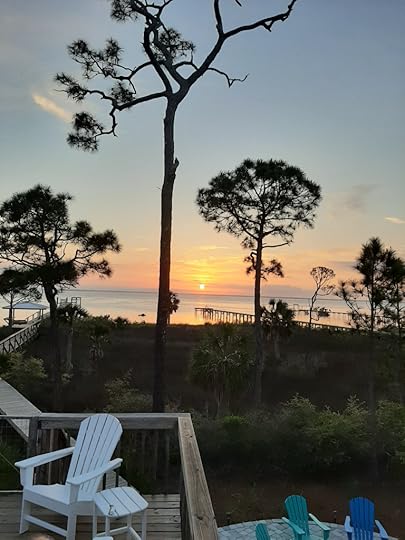 A coastal sunrise
A coastal sunrise
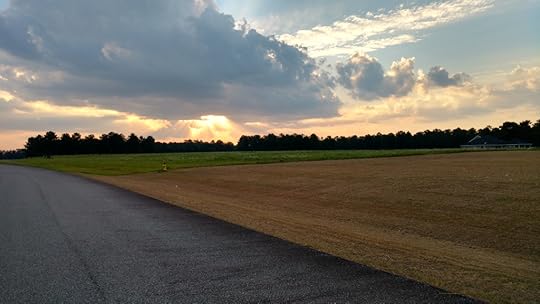 A South Georgia display of God’s steadfastness and power.
A South Georgia display of God’s steadfastness and power.
March 25, 2021
Is It Painful?

The little girls were playing in our backyard. Each was trying to teach the other a new trick. As I listened from the porch, I heard one say to the other anxiously, “Is it painful?”
I wasn’t sure the answer was honest. “No, it’s not painful. Come on. Just try it.” (If I had been doing the demonstrated trick it would undoubtedly have been quite painful!)
Thinking back on that little scenario, I smile to myself. If only you could face some of life’s tricks with that question: Is it painful? Realistically, we seldom have a chance to choose our path with that simple bit of knowledge. If I could have known on March 13 that I was going into a new trick and if I could have turned down the opportunity because it would be painful, then I guess I’d be a robot, a safe and whole robot, but a robot all the same. And that would not be my choice. But–I could wish I’d have been a tad more careful and “together” that morning.
Seven family members, all senior citizens, were staying in a cottage on Black Rock Mountain that weekend. We’d arrived in Clayton on Friday night, eaten at Ingles, and done our grocery shopping. The evening was spent telling tales, some old some new, taking in the view from the porch of Clayton laid out like a sparkly blanket among dark recesses of mountains, and falling into bed.
We always have such fun cooking together and this was no exception. We burst into giggles over the smallest thing, like someone’s shirt being backwards or some hungry person serving themselves two helpings of grits, one on each side of the plate. Breakfast over, we were bragging on grandchildren pictures, gazing at Clayton waking up in the valley below, asking Charlie one more time which mountain peak was which, and drinking a second cup of coffee.
I chose this time to pull out a knitting project I wanted Suzanne to help me with. I didn’t ask anyone, before I made the slight twist turning from a chair to the couch, if it would be painful. I lost my balance and landed hard on my right hip. Yes, it was very painful! But I thought it was simply a very bad bruise and, with help, hobbled around all weekend using a borrowed walker. On Sunday we made the seven hour trip home to Cairo. For some blessed reason, I slept most of the way.
I was shocked Monday morning at Grady General’s ER to learn that I had broken my hip just below the ball and would have to have surgery. Surgery was at TMH, Tallahassee, Tuesday afternoon thrusting me into pain that seared my brain, destroyed any prideful thoughts of self-sufficiency and made me cling in the middle of the nights to the words, “For he knoweth our frame; he remembereth that we are dust.” Psalm 103:14
Friends and family have been so supportive but none more so than Charles who has had to shorten his stride to hang back with my turtle steps.
Is it painful? Yes, but that doesn’t mean it’s all bad. Pain is a very rigorous teacher. Would we want to give up the experience of new jobs, new relationships, new challenges because they are painful? Of course there are challenges, and there are greater challenges. I’m not about to sky dive as my nephew Eric loved to do or hike Pike’s Peak with Phillip. I will, with His great help, harness in to the challenges the Lord has given me.
Having crossed the river of pain (maybe the worst of it anyway!), I now can flex stronger muscles for the PT trainer, and ask for more ice packs. Instead of pain reliever induced panic attacks I can enjoy the sunshine outside glancing off mounds of colorful azaleas and chuckle at the cute get well cards sent by precious well wishers. I can even think about asking for my knitting. Maybe tomorrow.
March 9, 2021
A Patriotic Moment
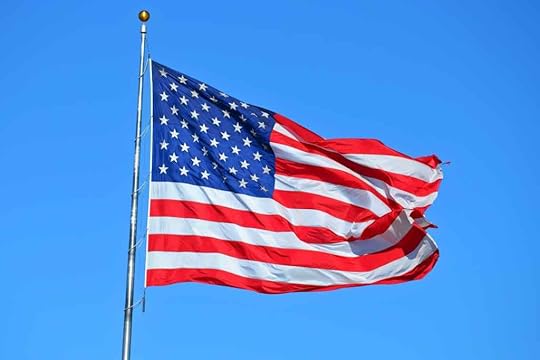 Photo by Brett Sayles on Pexels.com
Photo by Brett Sayles on Pexels.comWe’ve been inundated with injustices by the Left. We fear our constitutional rights are being taken away as, in fact, they are. One of the scariest movement is that of infiltrating our schools with unpatriotic ideas and rewriting our country’s history. It reminds me too much of the way Austrians peacefully let themselves be taken over by Hitler March 12, 1938 because they simply didn’t realize, until it was too late, what was happening.
But last week Charles and I were refreshed and touched by a little scene that played out in our kitchen.
Kaison, eight years old, had to go to the dentist that day. Amanda, his mom, asked us to be responsible for him that day including the dental visit. He arrived about 6:45 that morning talking constantly. He was really excited about going to the dentist, about taking the medicine to make him sleepy, but his main topics of conversation concerned characters of his imagination including fantastic monsters. He only paused long enough to say he was hungry. I checked with Amanda to be sure he could have some breakfast. He ate cereal talking full stream ahead between bites.
Charles read our Bible selection for the morning. Kaison, with great difficulty and a few reminders, was able to listen. He has a habit of pounding a spoon, knife or fork into the table as if he were driving pilings for a river bridge. That morning, since he couldn’t talk, he began pounding. I kept giving him less and less damaging utensils until he was trying to drive his pilings with a napkin. During our prayer I could hear his constant wiggle but, between Grandaddy’s praying very briefly that morning and Kaison’s using every bit of his tiny self-control, he didn’t talk until the n of “amen” sounded.
Immediately he announced we were to do the pledge of allegiance “because that’s what we do at school.” (Yay! for Grady County schools!). He thumbed right to a flag on his cell phone and we all stood facing it as solemn as soldiers with hands on our hearts. Kaison’s voice was loud and clear reciting the words: “I pledge allegiance to the flag of the United States of America and to the republic for which it stands, one nation under God, indivisible, with liberty and justice for all.”
Thinking the ceremony was over, I began to stack cereal bowls. But Kaison wasn’t through. “No, now we have to sing the anthem,” he said. So, again with hands on our hearts and standing in a solemn straight row, we sang along with music from his cell phone the dear inspiring words: “Oh, say, can you see by the dawn’s early light…” His voice was so clear and sweet and his pronunciation perfectly accurate.
It takes home and school to train a child to be patriotic and loyal. I’m thankful Kaison is receiving training from both sources. I pray for teachers across our land to be diligent in teaching patriotism and I pray our country never gives up its right to salute the flag and to defend her freedoms of religion, speech, and the pursuit of happiness.
March 8, 2021
His Mighty Power

Cancel Culture gets worse and worse (whoever heard of taking out Dr. Seuss?). Brave first responders are treated as the enemy. Politicians put themselves first rather than those who elected them. It is imperative that we remember that the One who created the earth and all that is therein is still in power. He who knows when a sparrow suffers will ultimately make everything right.
I wrote the following little essay several years ago for a still unpublished book, Holy Sandpaper, a collection of sixty-six devotions, one for each book of the Bible. I’m pulling it out today to remind myself of His mighty power and hope it means something to you.
His Mighty Power
“…for he commandeth even the winds and water, and they obey him.” Luke 8:25d
The disciples had been with Jesus when he cleansed a man of demons (Luke 4:35), healed Simon Peter’s mother-in-law of a fever (Luke 4:39), brought Simon a huge draught of fish when he’d been unable to catch anything (Luke 5:6) healed a man of palsy and forgave his sins (Luke 5:24-25), healed a man’s withered hand (Luke 6:10), healed the dying servant of a centurion long-distance (Luke 7:10), and raised up the dead son of a widow (Luke 7:13-15). But when the disciples witnessed Jesus calming a raging storm, it “blew them away.” “even the winds and water…obey him.”
I can hear the breathless reverence in the voices of the disciples. I don’t know how big that boat was, but I can imagine each one of those rough and tough men feeling the need to prostrate themselves before the Lord if there were room. They were breathless first with fear of the storm, then breathless over the miracle they saw with their own eyes.
Highly trained weather forecasters warn us when there’s danger of tornados and hurricanes, hail storm, and severe thunderstorms. Warnings save hundreds of lives as citizens hear and heed the warnings. But no one can change the weather, only predict it. And the predictions aren’t always accurate because wind currents can suddenly change direction, strength, and speed. Rise and fall of temperatures also affect an oncoming storm.
I’m a survivor of a tornado that hit my home in north Georgia when I was a child and of a hurricane that bombarded my south Georgia home when I myself was a parent. The strength of those storms was incomprehensible. One minute hundred-year-old stately pines were standing tall, the next they were splintered and felled, plowing up the earth where they hit. We were fortunate in the hurricane that our house was only damaged and a few trees blown down. Others lost their houses and barns. It always amazes me to see how a tornado can dip down, take half a house and shred it, yet leave the other half standing with a coconut cake sitting on the kitchen counter or a piano fully intact with a hymnbook on its rack.
We can see the power of the Lord displayed in a spectacular lightning storm. Charles has been called as a veterinarian to pronounce reason for death of cows, sometimes six or eight, struck by lightning while huddling together under a tree.
The power you see in a storm may also be seen in changed lives, healed bodies, circumstances miraculously adjusted or overcome. Have you seen His power lately? Look for Him to be at work in you and around you! Watch diligently for the works of the One whom “even the winds…obey.”
Almighty Master of the winds and the waves, I put my trust in You, and eagerly expect great things to happen. Amen.
March 1, 2021
Tiny Silver Cable Cars
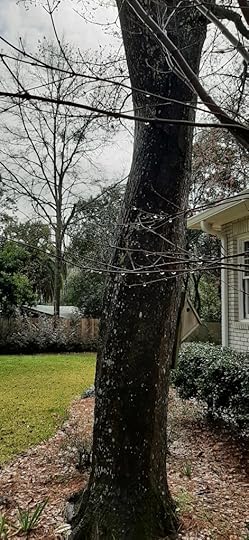
Tiny silver cable cars
Raindrops in a row,
Carrying microscopic skiers
To a place where there is snow.

Rosy blossoms wildly strewn
Beneath a cherry tree–
Carpet good for any queen
And all her court to be.
Neat hard buds on branches bare
Against a platinum sky
Burst into a cloud of pink,
Paradise for passersby.

Winter rules one dark day.
Spring comes in the next.
Our Father paints in grays and reds;
Every picture is the best.
February 23, 2021
Remembering Maggie
Memories of our childhood companions fade into the background until something triggers a recollection. The recent heavy rains brought to mind our dear Maggie, a faithful and much loved playmate for my sister and me.
Maggie wasn’t just a playmate. She joined our family very early on a cold New Year’s morning. There was great excitement surrounding her arrival. Some of the family had anticipated she was coming but Suzanne and I were totally unaware of such a momentous change in our lives. At first I wasn’t sure how to welcome her since she was deaf and dumb. But Suzanne and I quickly learned how to communicate with her. Smiles, thumbs up or down, a shake of the head, and many dramatic gesticulations kept us on the same page most of the time. Any arguing was between Suzanne and me over what Maggie might be trying to tell us.
Maggie was beautiful with soft dark brown hair often braided into pigtails. She had rounded limbs, nearly always a sweet expression on her round little face as if she wanted more than anything to please us. She was only a little smaller than Suzanne. We mothered her a lot and she let us. She slept between us and never poked her elbows into us or kicked us, though we weren’t always that kind to her, I’m afraid.
One of us would carry Maggie when we took her to the woods. We didn’t want her to be lost or afraid. But she never seemed to fear anything even when we made her climb trees with us. I would go up first, then Maggie, and finally Suzanne, ready to catch her if she fell. Sometimes I’d be pulling her by one arm while Suzanne steadied her feet on a sturdy limb. Since she was dumb she couldn’t complain but we tried to be mindful of her expressions and often talked for her.
“Oh, that was too hard a climb, wasn’t it, Maggie?” one of us might say.
“No, it was all right, let’s go higher” the other would reply for Maggie.
Maggie was not blood kin but she became a full member of our family. Even with her disabilities she sometimes was the life of our playful dramas. And when we went in to supper Suzanne and I vied for having Maggie at our side. Usually brothers and sisters adjusted their seating so we could have Maggie between us. I couldn’t be sure Maggie cared where she sat. She seemed to love everybody. She was always neat, too, never spilling any food down her front. Suzanne and I argued sometimes about what food Maggie liked the best. Mamma would finally stop us and say we should let Maggie show us what she liked. With the use of sign language it really wasn’t hard to realize she liked best Mamma’s hot stovetop biscuit bread cooked on an iron griddle and loaded with butter.
There was a Maggie song circulating at that time. It became a favorite of ours because, even though it was about someone courting a Maggie, we thought it was quite appropriate for our playmate and big family. Here’s how it went: “There was her father, her mother, her sister and her brother–oh, I’ll never see Maggie alone.” Suzanne and I sang it at top volume as if Maggie might be able to hear us and enjoy the humor.
Though she couldn’t understand much of what we were studying, Maggie sat with us in our home school sessions. Maybe we were even guilty at times of blaming poor Maggie when we didn’t answer questions correctly. Maggie did something funny and made us forget. Or Maggie needed special help just then so we didn’t finish our assignment.
One day the three of us were playing in the backyard. We constructed a truly fantastic playhouse using tree branches, firewood, and cardboard boxes arranged over and around a huddle of great gray rocks. Maggie didn’t help a whole lot. But when we “moved in” our new house she was happy. She was so cute sitting with her back to a rock holding a mouthwash lid teacup in her lap. We all had “tea and crumpets” before Daddy called us to recite our daily spelling words. Maggie liked the house so much she didn’t want to leave so we left her there still enjoying her tea.
A sudden shower came up during our spelling lesson. Would our nice playhouse stay dry for Maggie? As soon as we could, we rushed out to see about her.
Maggie was soaking wet. No matter how hard we tried in the days afterward we couldn’t dry poor Maggie. Mamma put her in a chair near the stove and we all turned her this way and that. Then we set her in a sunny spot outdoors for hours on end but she remained soggy and heavy. You see, Maggie was a wonderful life-size rag doll our older sisters made for us. Her stuffing, consisting mostly of rags, got so wet that it soured before she ever could dry.
We were disconsolate over the loss of Maggie who didn’t get pneumonia, or bronchitis, or the flu. She just “died” from over soaking. We had sung so lustily about Maggie’s never being alone. But that day we did leave her alone.
The frequent rains recently triggered that recollection and reminded me of the diligence and love of those sisters who made our amazing doll. I’m also filled with gratitude for Mamma who played along with us in our imaginative conversations with Maggie and for her valiant attempts to dry our playmate. I’m thankful for brothers who used great self control and didn’t laugh (much, anyway) when Maggie “melted.”
Our playmates, even a rag doll, play a role in who we become.
February 12, 2021
The Barren Heifer
Life with a veterinarian is always full of surprises. One of those was Red, a newborn heifer.
One of Charles’s farmer clients asked him who might want a sterile heifer. Her mama had birthed a male to weeks before this twin was born. In this case, a female twin born with a male, it was believed that the female would never breed. In addition to her unfortunate birth circumstances, Red, as we appropriately named her, was a runt. The farmer who was proud of his shorthorn herd, didn’t want this one sullying his reputation. More importantly, he wanted the male twin to have every bit of his mama’s nourishment.
When the farmer asked who might like to have the runty sterile heifer, Charles said he would take her. I think she may have been the first of a long line of animal gifts we received.
We raised her as a pet. At the time we didn’t own the pasture behind our house. Red, the small heifer, occupied a makeshift pen in our backyard. William, about five then, learned how to give her her bottle. She was an eager eater which, of course, made her grow fast. Even a runty heifer when grown is a cow.
It happened that by the time Red outgrew her pen we had been able to buy the adjoining pasture and barn so Red had plenty of room to frisk about. As she matured Charles began to wonder if she was indeed sterile. Never one to accept undocumented facts as truth, he decided to do an artificial insemination on her and just see. By and by it became obvious that Red was not sterile.
She was still a small heifer. She was still a red shorthorn, though actually she had no horns so was a polled shorthorn. And Red was definitely still our pet as much as our dogs in the yard and our cats in the house. She came to the fence when she saw any of us exit the back door, especially if it were Charles. She’d let us pet her and would follow us around like an overgrown dog as we picked up pecans. I was never afraid of her but I did get nervous when I was in a vulnerable pecan-picking position and she came up behind me. She never pushed me over, though she did nibble at my shirttail a time or two much to William’s delight.
Charles very seldom got sick. But that February he had a lingering case of the flu and was at home in the bed for several days. One of those days, a gloomy cold rainy day, I heard Red let out an unusually distressful bawl. When I looked toward the pasture and saw her at the fence looking mighty uncomfortable I knew. This was her time. Well, she’d better be able to take care of this herself because her veterinarian was in the bed.
Time went by and Red was still in trouble. She walked back and forth, bawling and stopping often to look at me with an expression that said, “Why don’t you do something?” All I could do was talk to her and assure her over and over that it would soon be over. I could see feet presenting. I’d watched Charles deliver calves many times but I knew I couldn’t do it.
It wasn’t soon over. Poor Red was still in labor. Finally, as you would suspect, Charles went out in the winter weather to check on his heifer. With his help, Red at last gave birth to a healthy male calf. “Doubled our herd,” Charles said with a grin.
William was overjoyed. Another baby to bottle feed! But no–this baby had a very good mama who would feed him and care for him.
Red was thought to be sterile and useless, a runt of bovine flesh. But Charles wasn’t convinced that she was no good. She became a favorite pet at our house and birthed two calves. She may have been no good commercially. But to us she was a treasure.
As I reflect on Red on this another cold gloomy winter day, I’m reminded of how God treasures each of his creations and gives us life though we in no way deserve it. Ephesians 2:4-5 says: But because of his great love for us, God, who is rich in mercy, made us alive in Christ even when we were dead in transgressions–it is by grace you have been saved.
[image error]Brenda Knight Graham's Blog
- Brenda Knight Graham's profile
- 1 follower



